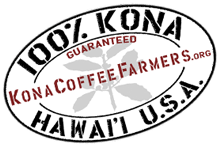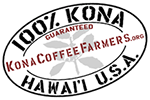March 24, 2019
To: Governor David Y. Ige
c/o Cindy McMillan, Communications Director
Dear Governor Ige:
I am a coffee farmer in the North Kona District of Hawaii County. I have publicly supported your two campaigns for governor.
I am writing to express concern that with regard to HB144 your administration’s Hawaii Department of Agriculture (HDOA) has sided with the 10% blenders and against the interests of Hawaii’s coffee farmers—and that the HDOA has made questionable assertions to the Legislature in its support of the blenders.
Background: For more than 27 years Hawaii has been the only state in the US and the only region anywhere else in the world to authorize by law the use of its regional names in the labeling of agricultural products with only 10% content actually grown in the named region. As a result, for more than 27 years, millions of dollars annually have been lost by Hawaii coffee farmers—and have instead flowed as “excess profits” to the mainland owners of Honolulu’s blenders. For more than 27 years, the State of Hawaii has failed to follow the example of other states that protect their farmers by requiring 100% genuine content in order to use their geographic origin names on labels—for example, “Idaho Potatoes”, “Vermont Maple Syrup”, Georgia’s “Vidalia Onions”.
This Legislative Session, however, 15 members of the House of Representatives took an important step toward the fair labeling practices used in other states by introducing HB144. This bill provided two straight-forward changes—51% minimum genuine origin content and mandatory disclosure of the origins of coffee in Hawaii coffee blends. HB144 was favorably passed through the House of Representatives and sent to the Senate.
In written testimony to the Senate Agriculture and Environment Committee, however, the HDOA suggested a “gut and replace” maneuver to support the blenders’ desire to delay any labeling reform for at least 3 more years. AEN Chair Mike Gabbard bowed to that suggestion–despite reservations noted by all of the 4 other committee members. The two reforms approved by the House (51% minimum and identification of origins) have been removed entirely and replaced with a 3-year delay for a “study” and a “task force”. What is particularly concerning are the nature of the assertions made by the HDOA in its Senate testimony along with its Study/Task Force suggestion.
HDOA Testimony: the HDOA’s testimony to the Senate AEN Committee appears at https://www.capitol.hawaii.gov/Session2019/Testimony/HB144_HD1_TESTIMONY_AEN_03-18-19_.PDF Farmer concerns about that testimony include:
1—False History: The HDOA testimony asserts that the original 1991 10% blend law was the result of “mutual agreement” and “industry consensus”—with the suggestion that there should therefore be no change to the status quo unless there is consensus (including agreement of the blenders) to make a change. The historical assertion is false.
The facts are that in 1991, with the support of the Hawaii County Council on Economic Development, Kona farmers asked the legislature for a 51% blend minimum. It was the lobbying power of the blenders (specifically C. Brewer) that reduced the minimum to 10%. After the 10% law was enacted, Kona growers strongly criticized the legislation as “false advertising” (Tom Greenwell) and “a misuse of the cultural heritage of Hawaii” (Michael Craig). See Gerald Y. Kinro, A Cup of Aloha, at pg. 109—with footnotes and citations.
Kona’s coffee farmers have been seeking reform of the “false advertising” built into the 10% law ever since.
The HDOA should be standing up for the interests of Hawaii’s coffee farmers, not using false history to promote the status quo in the interests of the blenders.
2—Extreme Hardship on the Blenders: The HDOA testimony willfully ignores the reality of modern labeling technology by parroting the blenders’ assertion that listing the origins of coffee in blends would “place an extreme hardship on the blending industry.” For example, the state’s largest blender, Hawaii Coffee Company (a wholly owned subsidiary of the state’s largest beer and alcohol distributor [Paradise Beverages], which in turn is a wholly owned subsidiary of a multi-billion-dollar mainland conglomerate [Topa Enterprises]) has printing capability that would allow label changes with little or no burden. In any case, consumers are entitled know what is in the package—a small price for blenders for using Hawaii origin names on packages containing substantial amounts of foreign-grown coffee.
3—Ignoring Available Studies: Again, in support of the blenders, the testimony of the HDOA willfully ignores the facts in arguing that the status quo should be maintained until a study is completed and then considered by a task force. There are, in fact, available studies (not mentioned or considered in the HDOA testimony) that confirm what basic economics and common sense indicate—that 10% blends keep farm gate prices lower and take money from the pockets of Hawaii coffee farmers. For example:
–A 2018 United Nations’ Food & Agriculture Organization study concludes that Hawaii origin brands, like Kona, do “not enjoy any strong protection of its name” and that as a result “downstream stakeholders [rather than farmers] reap the economic benefits of the fame of Kona.” http://www.fao.org/3/I8737EN/i8737en.pdf
— Additionally, a 2010 analysis by San Francisco-based resource economist Marvin Feldman finds that as much as $14.4 million each year may be flowing out of the pockets of Kona coffee farmers and into the “excess profits” of blenders. https://konacoffeefarmers.org/temp/kona-labeling/economic-effects-of-blending-kona-coffee/
–And the Legislature in 2007 made a factual findings that “existing labeling requirements for Kona coffee causes consumer fraud and degrades the ‘Kona coffee’ name” and that “confusion as to the difference between Kona coffee and Kona coffee blends caused Consumer Reports magazine to rate Kona coffee as ‘second rate'”. SCR No. 102, SD 1, HD 1.
It is my sincere hope that as Governor you will recognize that, if Hawaii is to make progress toward food sustainability, your administration and its Department of Agriculture should be supporting Hawaii farmers. I encourage you to work with the Legislature for enactment of HB144 in the form in which it was drafted and passed by the House of Representatives.
With respect and aloha,
Bruce Corker
Rancho Aloha
Holualoa, Hawaii County

